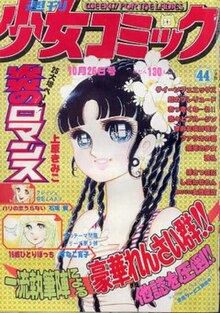Sho-Comi
 | |
 The cover of the October 26, 1975 issue of Shōjo Comic | |
| Categories | Shōjo manga[1][2] |
|---|---|
| Frequency | Monthly (1968–1969) Semimonthly (1969–1970) Weekly (1970–1978) Semimonthly (1978–present) |
| Circulation | 102,167[2] (July–September 2016) |
| First issue | 1968 |
| Company | Shogakukan |
| Country | Japan |
| Based in | Tokyo |
| Language | Japanese |
| Website | sho-comi.com |
Sho-Comi (少コミ, Shōcomi), formerly published under its full name Shōjo Comic (少女コミック) until December 2007,[3] is a shōjo manga magazine published semimonthly in Japan by Shogakukan since 1968.
The manga featured in Sho-Comi are later compiled and published in book form (tankōbon) under the Flower Comics imprint.
History
Beginning with the January 2008 issue published in December 2007, the magazine was renamed Sho-Comi. [3]
Serializations
Current
- Jingi Naki Mukotori (2020–present)
- Seishun Heavy Rotation (2020–present)
- Isekai Maō wa Fujoshi o Zettai Nigasanai (2020–present)[4]
- Tsugi wa Ii yo ne, Senpai (2021–present)
Past
1968–1979
1980–1989
1990–1999
|
2000–2009
|
2010–2019
|
Reception
In 2007, the Japanese National PTA Conference ranked Sho-Comi the worst manga magazine for young children due to its excessive sexual content.[11][12] Many concerned parents have advised publishers to be more wary of the availability of these magazines to young readers.[13]
From January to March 2019, Sho-Comi had 70,000 physical copies in circulation, which later dropped to 68,000 from April to June 2019.[14] From July to September 2019, the magazine had 63,000 physical copies in circulation.[15]
See also
References
- ^ Thompson, Jason (2007). Manga: The Complete Guide. New York: Del Rey Books. pp. 23–24. ISBN 978-0-345-48590-8.
- ^ a b 印刷部数公表: 少女向けコミック誌 [Number of Printed Copies Announced: Comic Magazines for Girls]. Japanese Magazine Publishers Association (in Japanese). Archived from the original on August 6, 2017. Retrieved November 6, 2016.
- ^ a b "Sho-Comi50周年特集、50年の歩みを年表で振り返る". Natalie (in Japanese). 2018. Retrieved December 3, 2019.
12月刊行の2008年1号にて、ロゴ表記がSho-Comiに変更。
- ^ Pineda, Rafael Antonio (2020-07-06). "Gō Ikeyamada Reveals Title, Visual of New Manga". Anime News Network. Retrieved 2020-07-05.
- ^ Ressler, Karen (2017-09-18). "Hana ni Kedamono Romance Manga Gets Live-Action TV Adaptation". Anime News Network. Retrieved 2019-07-17.
- ^ Pineda, Rafael Antonio (2016-04-22). "'4-Gatsu no Kimi, Spica' Manga Gets Live-Action, Movie Comic DVD". Anime News Network. Retrieved 2019-07-10.
- ^ Ressler, Karen (2017-10-23). "Hana ni Kedamono Live-Action Drama's Video Previews 'Heart-Pounding' Scenes". Anime News Network. Retrieved 2019-11-25.
- ^ Hodgkins, Crystalyn (2019-11-29). "Kanan Minami's Awa-Koi Manga Returns from Hiatus on December 6, Enters Final Arc". Anime News Network. Retrieved 2019-11-29.
- ^ Pineda, Rafael Antonio (2018-01-04). "Gō Ikeyamada Launches New Dō·Kyū·Sei Romance Manga in February". Anime News Network. Retrieved 2020-07-05.
- ^ Hodgkins, Crystalyn (2020-03-20). "Gō Ikeyamada Ends Dō·Kyū·Sei Romance Manga in 4 Chapters". Anime News Network. Retrieved 2020-07-05.
- ^ Loo, Egan (May 17, 2007). "Japan's PTA Decries Shin Chan Anime, Shōjo Comic Mag". Anime News Network. Retrieved November 12, 2019.
- ^ "Sho-Comi the Worst Shojo Manga Magazine for Children According to Japanese Parents". ComiPress. May 17, 2007. Retrieved February 18, 2009.
- ^ "On Modern Shoujo Manga and Sex: Excessive Sexual Material in Shoujo Manga and Magazine". ComiPress. November 30, 2006. Retrieved February 18, 2009.
- ^ Fuwa, Raizo (2019-09-14). "ちゃおがトップの33.7万部…少女向けコミック誌の部数動向をさぐる(2019年4~6月)". Yahoo! News Japan (in Japanese). Retrieved 2019-12-03.
- ^ Fuwa, Raizo (2019-11-25). "「ちゃお」がトップの30.3万部…少女向けコミック誌の部数動向をさぐる(2019年7~9月)". Yahoo! News Japan (in Japanese). Retrieved 2019-12-03.
External links
- Official website (in Japanese)
- Official circulation numbers at JMPA (in Japanese)
- Official publication information at Shogakukan AdPocket (in Japanese)
- Sho-Comi's 50th anniversary (interviews and chronology) at Comic Natalie (in Japanese)
- Sho-Comi at Anime News Network's encyclopedia
